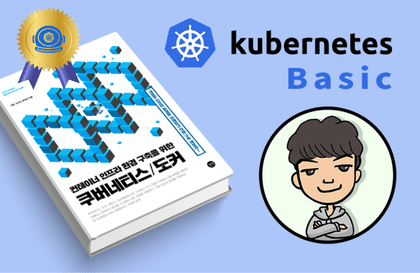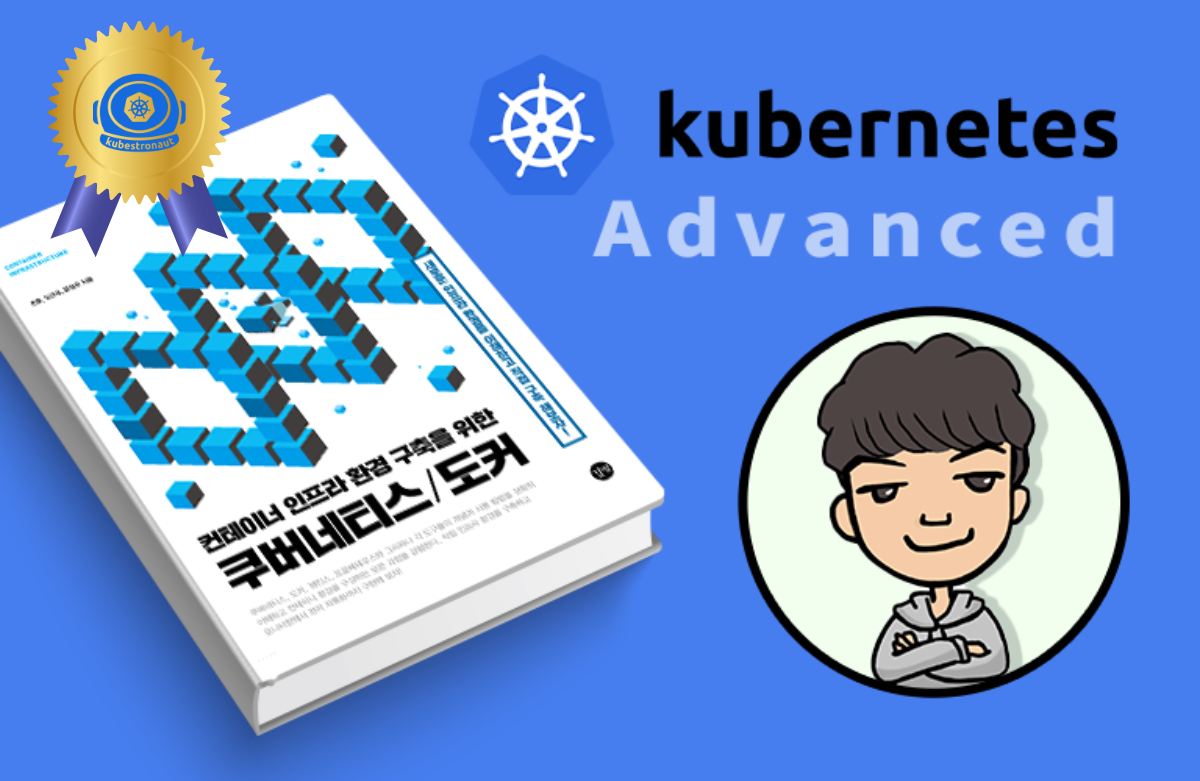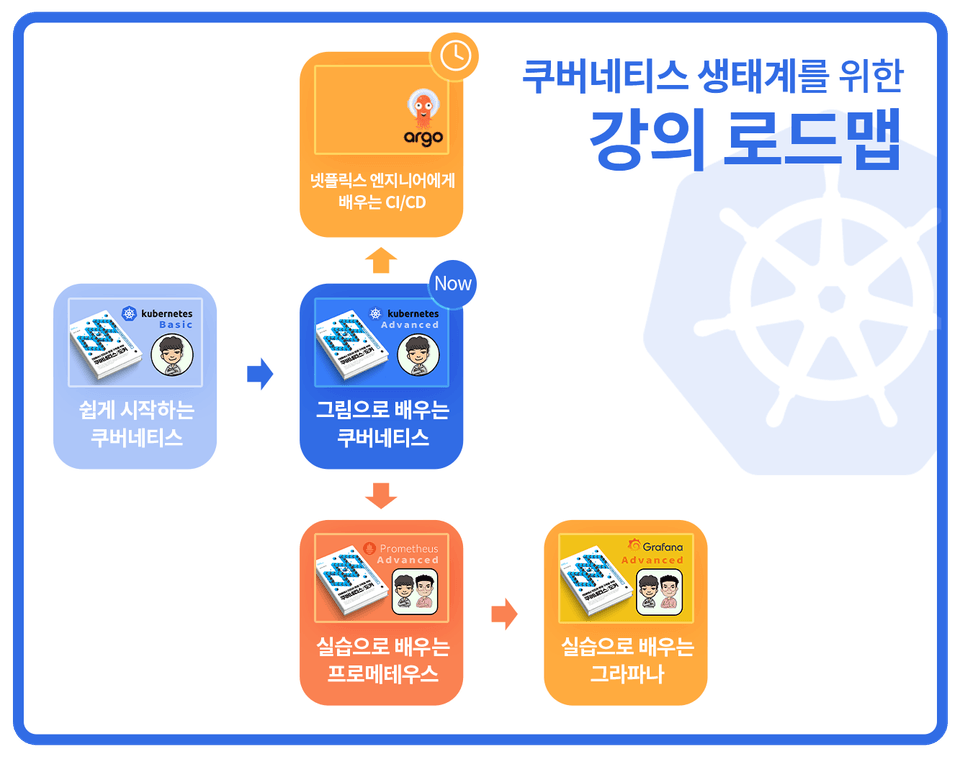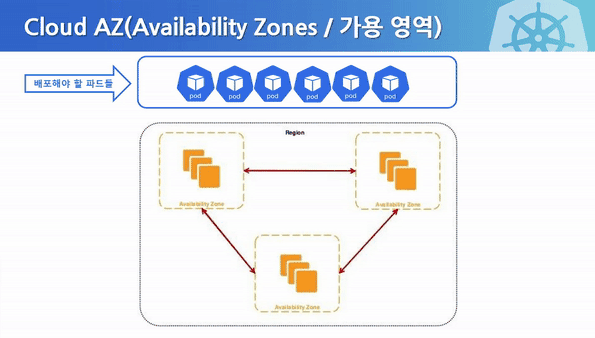
Getting Started with Kubernetes (v1.30) - {{ x86-64, arm64 }}
kubernetes
Contains content essential for truly starting with Kubernetes (☸). 🧭 Through this course, you can most easily grasp Kubernetes' structure and begin. 🥇
초급
Kubernetes, Docker

Much of Kubernetes (☸) can be learned through illustrations. 🧭 It expands on the verified content of the bestseller 'Kubernetes/Docker for Building Container Infrastructure Environments' for deeper Kubernetes learning. 💯 Practical content is also regularly added to 'Supplemental Lessons'. 👉 Be sure to compare it with other courses! :)

I can understand the code (YAML) that makes up Kubernetes.
You can check the conditions of the Kubernetes infrastructure through code.
You can actually implement a Kubernetes cluster using kubeadm.
You can learn the use of kubectl's useful options (describe, logs).
You can deploy and expose objects like Pods and Deployments via code.
You can learn about the elements associated with Kubernetes service.
Learn diverse Kubernetes volume uses.
You can learn how to configure and manage Kubernetes nodes.
You can learn in detail how to configure and manage Kubernetes pods.
You can manage Kubernetes cluster resources.
You can learn in detail about scheduling, the core of Kubernetes.
A detailed look at Probes essential for Kubernetes developers.
You can learn various ways to effectively deploy developed containers.
You can learn ways to automatically manage applications (e.g., HPA).
Second Step in Kubernetes Voyage! 🚢
Lay the foundation for becoming a growing developer/engineer.

📢 Hands-on update to Kubernetes v1.30!
This lecture was created to structurally organize the parts that are difficult to learn through the Kubernetes documentation and to reduce the difficulty in learning Kubernetes in earnest through analogies and illustrations.
💡 Things to know before registering for a class
서비스 , are official Kubernetes terms, and duplication of terms is unavoidable in the process of bringing in the existing infrastructure structure.

The current lecture is structured to make it easy to understand the elements used in Kubernetes, and to distribute them through code so that you can use Kubernetes in earnest. Therefore, the main title is composed of three, and then the subtitles are organized after being detailed into subtitles.
A detailed table of contents is in the lecture introduction below, so you can refer to that.
Both the format for deploying and managing Kubernetes objects are implemented in a format called YAML. Therefore, it is difficult to understand the true meaning of Kubernetes elements without seeing the code using YAML. In addition, other tools for container infrastructure also operate based on code.
Infrastructure as Code (IaC) is an essential component of Kubernetes and almost all the product families that make up the Kubernetes ecosystem. Therefore, we hope that you will learn Kubernetes as Code as soon as possible and grow into a leading developer/engineer using it.

Why not start learning Kubernetes with code right now?
I've seen many people around me who have started Kubernetes but have a hard time figuring out how to study it. Even if you've already grasped the concept through 'Easy Start with Kubernetes'... In fact, if you want to properly handle Kubernetes, there are very few things you can do without code .
Therefore, this lecture is designed to address the following concerns: 'Can we teach people how to easily and really easily handle Kubernetes as code ?' and 'How can we help them participate in the Kubernetes ecosystem?'
If you listen to and understand all of the lectures now, you will be able to understand the architecture pictures below.




Different types of Kubernetes architectures




Why Kubernetes Wants to Manage Cgroups with Systemd (See Slides )


How to set up GCP CDN on GKE (see slides )

Q. Can I take this course without attending the pre-lecture, ‘Easy Start to Kubernetes’?
That's the question that was in the expected questionnaire. As for the level of recommendation, I would like to recommend that you listen to ' Easy Start with Kubernetes '. This is because during the lecture, I will not continue to explain the content that has been explained before or the concepts that have already been explained.
In order to make a more accurate judgment , if you have already looked at the contents in the current table of contents and know more than half of the contents , it would be okay to listen to it right away. Or, if you have already sufficiently learned the book ' Kubernetes/Docker for Building a Container Infrastructure Environment ', it would be okay to listen to it right away. However, because there is a flow, if possible, I would like to recommend that you listen to it after listening to ' Easy Start with Kubernetes '. This is based on personal preference and understanding, so I ask for your understanding that I can only recommend it.
Q. Do I have to learn Kubernetes through this course?
I am an honest person. 'No'. The best textbook is the official Kubernetes website . However, the official website has some parts that are difficult to define when to start studying from the beginning and how to learn. For example, you can think of the official Kubernetes website as a 'textbook' and this lecture as a 'reference book'. You learn from the textbook, but in order to understand new content, you can grasp the concepts through the reference book and then look at the textbook again. :)
Q. Can I learn everything about Kubernetes just by taking this course?
As mentioned in the previous lecture (Easy Start with Kubernetes), it is impossible to teach everything about Kubernetes in a few dozen hours of online/offline lectures. Kubernetes is a technology that requires a lot of individual study because all the elements in modern IT are continuously being integrated.
So, we have future lectures prepared to help you with your personal study.
Version 💾
Infrastructure Configuration Tools 🏗️
x86-64
arm64
Terminal Access Tool 🚀
Lecture Source
📣 Please check before learning!
Who is this course right for?
To those who awaited the next '쉽게 시작하는 쿠버네티스' lecture
Those who struggled with the Kubernetes manual
For those who wish to summarize broad Kubernetes concepts at once.
For those who requested a lecture on Kubernetes v1.30 (latest version).
For those who want to supplement the Kubernetes section of the book 'Kubernetes/Docker for Building Container Infrastructure Environments'.
Those who want to learn and deal with Kubernetes from a cluster concept, not a single node concept.
Anyone curious about practical matters.
Need to know before starting?
'Kubernetes: Easy Start' course or basic Kubernetes knowledge
Basic usage of vi or vim (Y, dd, p, :wq, :q!)
Basic Linux commands (e.g., cd, ls, cat, etc.)
Basics of networking (e.g., 192.168.1.10/24 and 192.168.1.101/24 can communicate)
Eagerness to learn markup languages like YAML (I will, of course, explain)
12,888
Learners
601
Reviews
554
Answers
4.9
Rating
6
Courses
Documents:
Channels:
• Github
• Youtube
메가존에서 쿠버네티스와 컨테이너 인프라에 관해 Tech Evangelist, CoE(Center of Excellence) 역할을 담당하고 있다. 주요 역할은 회사의 SaaS 제품에서 사용하는 쿠버네티스 환경을 현대화하고 비용을 최적화하는 것이며, 외부 고객을 위해 Tech Advisory와 Container Architecture Design 등을 지원하고 있다. 클라우드 네이티브 컴퓨팅 재단(CNCF)의 글로벌 앰버서더로, 클라우드 네이티브 기술, 나아가 인공지능 네이티브 기술이 널리 전파되는 데 기여하고 있다. 그 외에 'IT 인프라 엔지니어 그룹'의 운영진을 맡고 있으며, 오픈소스 컨트리뷰터로도 활동하고 있다.
평소에 지식을 공유하는 것을 좋아하여, 인프런/유데미에서 앤서블 및 쿠버네티스에 관한 강의를 하고 있고, 지식은 문서로 남겨야 진정한 의미가 부여된다고 생각하여 『컨테이너 인프라 환경 구축을 위한 쿠버네티스/도커』, 『우아하게 앤서블』, 『시스템/네트워크 관리자를 위한 파이썬 실무 프로그래밍』을 집필하였으며, 요즘IT와 같은 온라인 플랫폼 등에 종종 글을 기고한다.
All
184 lectures ∙ (33hr 33min)
Course Materials:
All
157 reviews
4.9
157 reviews
Reviews 6
∙
Average Rating 4.7
3
:: Pros 1. A good lecture to get used to Kubernetes while doing hands-on practice 2. Active answers make it easy to solve problems when errors occur 3. Additional lectures are added to cover Kubernetes in more detail 4. It is good to teach the skills needed to handle Kubernetes from a practical perspective 5. It is suitable for studying by focusing on the flow of Kubernetes by preparing all the complicated parts 6. There is a lecture that organizes some confusing terms to reduce the difficulty of students as much as possible :: Cons 1. The level of explanation is not accurate or clear and ends at a general level (It is said to be intermediate or higher, but even for intermediate level people, the explanation is general ※That does not mean it is insincere) It is better to read the official doc to understand properly (If you explain at a level of a general introduction and proceed with the practice right away, you will end one class) 2. There are some parts that use ambiguous expressions or do not understand exactly and speak in a way that makes you understand ambiguously (This part It is covered by revisions in the supplementary lectures later, but it is difficult for students) 3. A lecture that you will regret if you listen to it expecting detailed explanations from other lecture reviews :: Personal overall review 1. Very good for learning the flow of Kubernetes and the way it is handled from a practical perspective 2. Good for getting used to entering and setting Kubernetes commands 3. It seems good for people who have a certain level of understanding of Kubernetes as it provides various supplementary lectures and the know-how of the instructor 4. If you are completely new to Kubernetes, this lecture is likely to be a waste of time. Based on the results of the lectures before this lecture, it is definitely helpful to watch and listen to the lectures before this lecture, but it is not dramatically helpful. It is suitable for those who need practical experience after watching the official Kubernetes homepage doc or other lectures.
4th match
Hello MIN and Desire Hamburger, I originally thought that not responding to opinions that have various meanings is respect for the opinions, so I did not reply, but I will share my thoughts on the review as follows. As I wrote in the lecture description above, I think the best textbook is the official Kubernetes website, and I still have no change in that opinion. However, I do not understand why it is called "a waste of time". Everyone has a different way of learning, and I do not understand why it should be evaluated as a "waste of time". I think you will know how much that word causes pain to the creator later (though it would be best if you do not). And it is 'people' who directly check reviews with that word and feel emotions. It is not a machine. Also, I am curious, which **other lectures** (among all lectures provided domestically/overseas) are suitable for a complete beginner? If there is something I can learn from there, I will accept and modify it. No matter how much I think about it, I don't know which domestic/international lecture you are referring to. My intention is that there are some people who find it difficult to start with the official Kubernetes website, so this is still a reference book. If MIN was a better person to start with the official website, then that is because MIN is very excellent and doing a good job, but I don't know if that is something that the current lecture should be criticized for. When you first took the lecture, you must have listened to it to fill in something that was lacking, but if you listened to it because [1-3] was lacking in the above overall review, I understand, but I would like to ask about your thoughts on [4]. As expected, as a Java Spring developer, you may have said that it was very difficult at first because of overlapping terms, but if you look at the official Kubernetes website, there are a lot of overlapping terms. This is something that happened while absorbing the open source characteristics and existing platforms, and there is something that cannot be helped. Anyway, what I want to ask is What kind of lecture is the perfect beginner's course that is not a "waste of time"? If "Official website"? Then the official Kubernetes website is a textbook and reference book, and if the official website is sufficient, there is no need to take the course... I don't know what you mean. The official Kubernetes website is one of the best-maintained documents among open sources, and there can be no course that covers "more content" than the official website. I still think that if the official website is sufficient, there is no need for a separate course. I never wrote that this is a priority over the official website... Why did you write "waste of time" here? If "Other course"? Then I'm really curious. What kind of course are you talking about when you are a complete beginner? I want to know what I am lacking. I don't really understand the 3 points. There are no 3-point courses on Inflearn. 3 points means that the course itself is completely meaningless and is only provided as a "waste of time". If we were to give it a grade, 3 points would be a C. (Actually, it's worse than that. I guess you didn't think about the grading system...) Did you think about it that much? I don't want to arbitrarily impose my thoughts, but I sincerely want to hear @MIN's thoughts and opinions. @All Since it's Chuseok, I'll send you an email later, but I think I'll have to listen to all the feedback and think about whether to stop or continue updating the lecture. I've been having a hard time lately because of the reviews.
I wonder if it would be okay if I reported at least 70~80%... Is it right to give a 3 point course evaluation based on 18%?
Reviews 3
∙
Average Rating 5.0
5
Although I have used Kubernetes briefly, I only used what I needed for work, so I often used it without knowing why I was using it, or without properly knowing what it meant or how it worked. But listening to the explanation slowly while looking at the pictures and example codes like this helped me organize my thoughts and it was very helpful. I would like to recommend it to both those who are completely new to Kubernetes, and those who have experience using it clumsily like me but feel like they can't explain it to others because they can't organize it!
Thank you for the detailed review. I hope we can study together for a long time as Kuber is a tool that will have a huge impact on IT infrastructure!
Reviews 3
∙
Average Rating 5.0
5
I got a lot of help from Kubernetes Easy Start! I was able to easily understand the concepts and principles through the explanations using pictures, and this Kubernetes with Pictures additionally includes code explanations, so I think I'm even more excited! Thank you for always giving great lectures. #KubernetesNavigationFighting
Thank you. :) I will work hard to create additional lectures to help you!
Reviews 2
∙
Average Rating 5.0
Reviews 1
∙
Average Rating 5.0
5
After first encountering Kubernetes through other basic lectures, I looked for an intermediate lecture and ended up taking the Kubernetes with Pictures lecture, and I started to understand things I didn't understand before. I always just followed along and used it, but I wanted to know more about the concepts, so I also paid for Easy Kubernetes. I recommend it to those who are new to Kubernetes. #KubernetesNavigationFighting
Aha, of course the other lectures are great too, but for various reasons, there were probably parts that weren't covered or had differences in perspectives, so some people had a hard time understanding them. I'm glad that those parts were filled in well :) Thank you for the review.
Limited time deal ends in 4 days
$115.50
24%
$152.90
Check out other courses by the instructor!
Explore other courses in the same field!